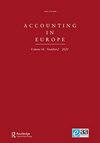IFRS in National Regulatory Space: Insights from Sweden
IF 4.3
Q1 BUSINESS, FINANCE
引用次数: 7
Abstract
Abstract Based on two empirical cases, this paper illustrates and comments on the complexities of implementing and enforcing International Financial Reporting Standards (IFRS) in a national setting. The paper sheds light on the difficulties that arise in the local regulatory space when IFRS requirements start to shape national accounting legislation and regulations. The findings suggest that the investor focus and requirements for managerial judgement of IFRS can pose two problems. Firstly, an extended influence of IFRS creates tension with established institutions that have developed in the local accounting tradition. Secondly, local organisations can respond strongly to new IFRS regulations and their potential implementation, even if the contradiction with local practice bears no immediate economic consequence to them. The study contributes to the contextualisation of financial accounting in national culture by highlighting the different understandings and uses of IFRS by actors involved in the Swedish regulatory space.国际财务报告准则在国家监管空间:来自瑞典的见解
摘要基于两个实证案例,本文阐述并评论了在国家背景下实施和执行《国际财务报告准则》的复杂性。本文阐明了当《国际财务报告准则》要求开始影响国家会计立法和法规时,地方监管领域出现的困难。研究结果表明,投资者的关注点和《国际财务报告准则》对管理层判断的要求可能会带来两个问题。首先,《国际财务报告准则》的广泛影响造成了与在当地会计传统中发展起来的老牌机构之间的紧张关系。其次,地方组织可以对《国际财务报告准则》的新规定及其潜在实施做出强有力的回应,即使与当地做法的矛盾对他们没有直接的经济后果。该研究强调了瑞典监管领域参与者对《国际财务报告准则》的不同理解和使用,有助于将财务会计融入国家文化。
本文章由计算机程序翻译,如有差异,请以英文原文为准。
求助全文
约1分钟内获得全文
求助全文

 求助内容:
求助内容: 应助结果提醒方式:
应助结果提醒方式:


